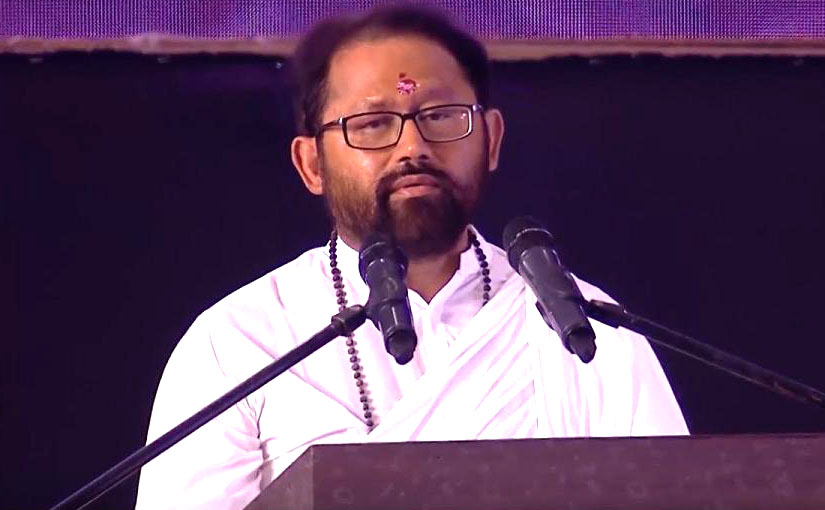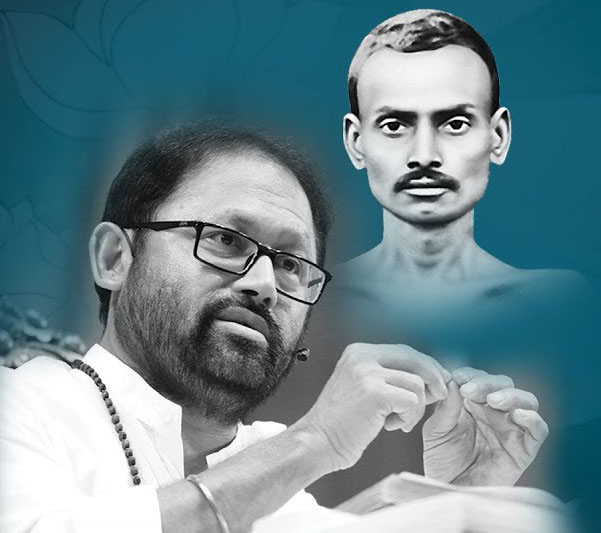The Principle of Aparigraha : By Pujya Gurudevshri Rakeshbhai
|
The Principle of Aparigraha
By Gurudevshri Rakeshbhai Modern day materialism defines a successful and happy person as one with the many possessions, great wealth and high status. Through an understanding of the Jain principle of aparigraha, Pujyashri Gurudev enlightens us on what brings true contentment in life. A great deal has been spoken and written about aparigraha or non-possessiveness; however, we are incognisant of its true depth. No doubt, we talk of non possessiveness with great respect and even worship the one who is non-possessive; yet, we remain unaware of its essence. Understanding Possessiveness : How can we acquaint ourselves with the true significance of non-possessiveness? To understand what non-possessiveness is, one must first comprehend the meaning of possessiveness. Commonly, possessiveness is understood as the possession of objects. But the Enlightened Ones say that possessiveness is delusion. It does not mean having a collection of things; it is the feeling of being the owner of those things. The 'number of things' therefore does not determine an individual's possessiveness; it is the attitude he harbours towards those things, the way he relates to them that determines his possessiveness. Our sense of ownership is not restricted to things alone, we display feelings of ownership even towards people. A husband tries to own his wife; a father his son; a teacher his student etc. This possessiveness is just another dimension of violence. Ownership implies possessiveness and where there is possessiveness, the relationship becomes violent. This is true because no one can own another without exercising violence by taking awayhis independence, by making the other a slave of his desires.
One may question, 'Why do humans want to control others? Why are they so interested in possessing others?' In response to this, the Wise say that because man has no authority over himself, he tries to make up for that 'lack of command', by ruling others. We wish to become independent by making others dependent on us. But we do not realise that dependence is on both sides; both parties get tied. Reigning over others cannot make us their owners; rather, it breeds sorrow. It is like attempting to quench one's thirst with fire. Possessiveness Leads to Slavery : We become slaves to the ones we try to possess; we get bound to them. The seeds of slavery are hidden in the very desire to be the owner. And the reason for this is that our sense of ownership is dependent on them. If the ones we claim to own leave us, with them goes our ownership too. If our ownership is dependent on others, then how can we be called their owners? Deep reflection reveals how we get bound by them, how they become our owners. Once a mendicant entered a village. He saw a cow, tied by a rope, being led away by his owner. Seeing this, he asked the villagers, "Is this man tied to the cow or is the cow tied to this man?" The villagers replied in unison, "It is the cow that is tied to the man. The man is the owner; he is independent. The cow is owned, dependent and hence, a slave." The mendicant asked again, "If the cow runs away, will this man run after the cow?" The people replied, "Naturally, the man will run after the cow." He further asked, "If the man runs away, will this cow run after the man? " The ascetic clarified the underlying meaning of his question, "Consider carefully, who is really dependent on whom. The cow is tied to the man with a rope but the man is imperceptibly bound to the cow. He is the one who cannot let go of the cow. It is only with this subtle insight that it becomes evident that the man is bound to the cow and not vice-versa." The only difference between the owner and the owned is that the slavery of the one who is owned is visible and that of the owner is not What is most amusing is that the one who is tied may even try to escape, but the other is under the delusion that he is independent. The secrets of possessiveness are very profound. It is essential that we understand its subtle facets. We collect things so that they can serve us but instead, we end up serving them. Does the treasure chest look after us or do we look after it? Objects are not to be blamed. We become their slaves of our own accord. It is our perception, our thoughts and beliefs that bring about this slavery. How can things make anyone their slave? They are not even aware that humans believe they own them. If one is filled with the desire for things, he experiences bondage, and bereft of desire, he is free. Who is a Real Owner? : In reality, one whose ownership is dependent on others, who tries to rule over others and make them his slaves is only possessive but not a true owner. One who has no longing to make anyone a slave and does not wish to own anything or anyone, he alone is a real owner in this world. He alonewhose ownership is not dependent on others, is truly non-possessive. He alone is truly happy, peaceful, settled and secure. Possessiveness implies forgetfulness of the truth that one is not the real owner of things, but deep within the knowledge that, 'I am not the owner' remains. Even Alexander and Hitler knew this. Strangely, the more one knows this reality, the more he tries to spread and strengthen his sovereignty on the outside. It is possible that he may forget for a short while but time and again he remembers, "I am not the owner, I am not independent, I am not at peace, I am not happy." This creates an inner void. One may try to fill this emptiness with wealth, name, fame, status and furniture but that vacuum, that hole, that inner poverty remains as it is. External things, outer associations cannot fill this abyss because they all remain outside, they cannot enter the realm of the Self. One is amassing 'things' but what is actually to be attained is the 'Self.' 'Things' can never become the 'Self.' What is Non-Possessiveness? : If outer things cannot fill the inner vacuum, then is it possible to do so by giving up those things? One feels that he has tried to bring the external associations closer and attempted to collect things, but these did not satisfy the inner wants; so he should try renouncing them and thus fill the emptiness. The Enlightened Ones question, 'If the inner deficiency could not be filled by the presence of external objects, then how can giving them up fill the space within?' But man is fundamentally mistaken in his thinking. First, he wishes to fill the inner chasm by collecting external things and having attained them, when he realises that they are incapable of filling the inner space, he tries to do so by relinquishing them. He is unable to understand that what cannot be filled with the addition of things will not be filled by subtracting them either. Non-possessiveness does not mean giving up outer things. Non-possessiveness means attaining inner completeness by realising the Self, by abiding in the Self. When inner fulfillment is attained, the emptiness within is filled and scurrying around to collect outer objects ceases. Having experienced inner absoluteness, the interest neither to hoard things nor to give them up remains. The outer associations drop on their own. When the Self is realised, inner wealth is attained. Then alone, does one understand how vain the effort of collecting or renouncing outer things is. Once inner completeness is attained, the hold over external things is automatically given up. One experiences that in reality one can never hold on to anything. Such a one, being in the midst of all, becomes non-possessive. The meaning of non-possessiveness is not to have the sense of ownership. Non-possessiveness is transformation in one's relationship with others. When the sense of ownership weans, it results in no possessiveness. With clarity about possessiveness comes the manifestation of non-possessiveness. May all attain the sublime state of being truly non-possessive.
----------------------------------------------------- Mail to : Ahimsa Foundation |
||

